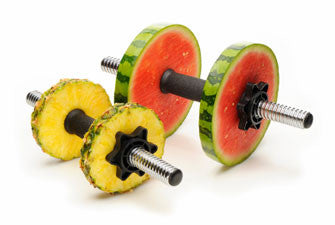Today's post is from guest blogger Leslie Vandever, who works for Healthline, an online health publication that is a great informational tool, especially when it comes to healthy living and nutrition habits. Leslie wrote about how to eat with an emphasis on nutrition for an athlete.
--
Baseball season is finally here! Whether you’re a serious athlete or a dedicated local league player, what you eat is going to be a major factor for good or ill in your overall performance at the game. The old analogy that compares the human body to a machine is an oldie-but-goodie: it can function at its peak level of performance only if it’s well-maintained and has both the right kind of fuel and enough of it.
For a great season of terrific play, your diet needs to be nutritious, balanced, and as healthy as you can make it. You’ll also need to make sure you’re staying well-hydrated, drinking at least eight cups of water a day—and more if you’re working out or competing on the ball field.
So, what’s a nutritious diet for an athlete (or someone who wants to eat like one)? According to the American Association of Orthepaedic Surgeons, carbohydrates—found in fruits and vegetables, whole grain breads, cereals and pastas, rice and foods—should form 60 to 70 percent of your daily diet.
Your body converts the sugars and starches in the carbs you eat into glucose, a simple sugar that’s the main energy source of the brain. Your body also turns glucose into glycogen, a complex carb made of hundreds of thousands of glucose molecules for limited storage in the muscles and liver. Glycogen is the fuel your body burns to produce power during high-intensity, short-duration activities. When you run out of it, your body instead burns protein and fat.
Proteins—found in meat, fish, eggs, nuts, seeds, dairy and other foods—should generally make up 12-15 percent of your daily diet. How much you actually need to eat depends on several factors:
- the type of exercise
- your fitness level
- your overall calorie intake
- your carbohydrate intake
Protein is vital to build muscle, other tissues, and fluid. The body is unable, however, to store extra protein. It either burns the extra off immediately as fuel or converts it into fat, which it can store.
Fat is vital to body function and is our main source of stored energy, but the body can’t make fat from scratch. It must come—in small amounts—from the foods we eat. Dietary fat should make up 20 to 30 percent of your daily calorie intake. But not all fats are equal. Saturated fat is found in meat, dairy products, and eggs. Unsaturated fat comes from some vegetables and vegetable products, such as avocadoes and olive or corn oil. Saturated fat—is associated with heart disease and some cancers, so it’s smart to limit the amount we eat every day.
Inside the body, fats are broken down in to triglycerides, cholesterol, and other essential fatty acids for use as stored energy, protection for vital organs and as insulation. Fatty acids also support growth, immune function, reproduction and other aspects of basic metabolism.
When you’re at rest or going about normal daily activity, your energy comes from stored fat, converted by the body back into energy. Increased activity burns through the small amounts of glycogen stored in your muscles and liver; if the activity continues at that level, the body starts burning off fat.
How does all this add up as nutrition during ball season? What you eat days before a game will affect your performance, so keep that in mind. It’s a good motivation for focusing on nutrition. On the day of the game, eat a good breakfast and make sure that you’re well-hydrated. Avoid high protein or high fat foods—they’re harder to digest and can stress the kidneys.
Three or four hours before the game itself, eat a good meal that’s high in carbohydrates. Choose foods that are easily digestible (not fried). Two hours before the game, drink 20 ounces of water. An hour before the game, avoid sugary foods and drinks. Half an hour before the game, drink 10-15 ounces more of water.
Then get out there and play ball! For more information about healthy nutrition, click here.
Leslie Vandever is a professional journalist and freelance writer with more than 25 years of experience. She lives in the foothills of Northern California.
References:
- Sports and Exercise. (n.d.) Academy of Nutrition and Dietetics. Retrieved on April 8, 2014 from http://www.eatright.org/Public/landing.aspx?TaxID=6442451999
- Sports Nutrition. (2007, Aug.) American Association of Orthopaedic Surgeons. Retrieved on April 8, 2014 fromhttp://orthoinfo.aaos.org/topic.cfm?topic=A00370
- Play Ball! Tips for the Weekend Baseball Warrior. (n.d.) Academy of Nutrition and Dietetics. Retrieved on April 8, 2014 from http://www.eatright.org/Public/content.aspx?id=6442463944
- How the Body Uses Fat. (n.d.) Howard Hughes Medical Institute. Retrieved on April 8, 2014 form http://www.hhmi.org/biointeractive/how-body-uses-fat
- Food for Sport. (2012, March 27) National Health Service. Retrieved on April 8, 2014 from http://www.nhs.uk/Livewell/Goodfood/Pages/Sport.aspx.



So I saw a testimony online about this spell caster who help people in getting back ex husband and wife together and I decided to get back my long lost relationship. I am happy today to have been helped by Dr. Odunga in helped me get my ex boyfriend back after 2 years of separation. My name is Kayla Darwin from Arkansas, USA and I am fulfilling my promise to Dr. Odunga to give my own testimony after he have helped me. I never thought I would have my ex boyfriend Justin back after he left me 2 years ago and Dr. Odunga helped me cast a love spell on him to bring him back to me. Thank you sir and I pray this testimony helps anyone who reads it to get their ex back also. His email is odungaspelltemple@gmail.com OR Whats-App +2348167159012